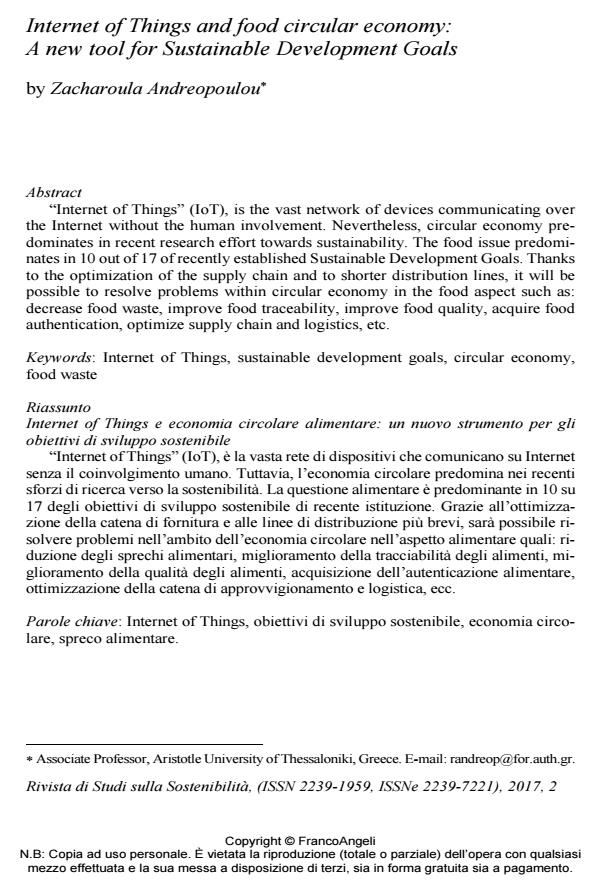Internet of Things and food circular economy: A new tool for Sustainable Development Goals
Titolo Rivista RIVISTA DI STUDI SULLA SOSTENIBILITA'
Autori/Curatori Zacharoula Andreopoulou
Anno di pubblicazione 2017 Fascicolo 2017/2
Lingua Inglese Numero pagine 7 P. 43-49 Dimensione file 134 KB
DOI 10.3280/RISS2017-002004
Il DOI è il codice a barre della proprietà intellettuale: per saperne di più
clicca qui
Qui sotto puoi vedere in anteprima la prima pagina di questo articolo.
Se questo articolo ti interessa, lo puoi acquistare (e scaricare in formato pdf) seguendo le facili indicazioni per acquistare il download credit. Acquista Download Credits per scaricare questo Articolo in formato PDF

FrancoAngeli è membro della Publishers International Linking Association, Inc (PILA)associazione indipendente e non profit per facilitare (attraverso i servizi tecnologici implementati da CrossRef.org) l’accesso degli studiosi ai contenuti digitali nelle pubblicazioni professionali e scientifiche
"Internet of Things" (IoT), is the vast network of devices communicating over the Internet without the human involvement. Nevertheless, circular economy predominates in recent research effort towards sustainability. The food issue predominates in 10 out of 17 of recently established Sustainable Development Goals. Thanks to the optimization of the supply chain and to shorter distribution lines, it will be possible to resolve problems within circular economy in the food aspect such as: decrease food waste, improve food traceability, improve food quality, acquire food authentication, optimize supply chain and logistics, etc.
"Internet of Things" (IoT), è la vasta rete di dispositivi che comunicano su Internet senza il coinvolgimento umano. Tuttavia, l’economia circolare predomina nei recenti sforzi di ricerca verso la sostenibilità. La questione alimentare è predominante in 10 su 17 degli obiettivi di sviluppo sostenibile di recente istituzione. Grazie all’ottimizzazione della catena di fornitura e alle linee di distribuzione più brevi, sarà possibile risolvere problemi nell’ambito dell’economia circolare nell’aspetto alimentare quali: riduzione degli sprechi alimentari, miglioramento della tracciabilità degli alimenti, miglioramento della qualità degli alimenti, acquisizione dell’autenticazione alimentare, ottimizzazione della catena di approvvigionamento e logistica, ecc.
Parole chiave:Internet of Things, obiettivi di sviluppo sostenibile, economia circolare, spreco alimentare.
- Voluntary traceability in food supply chain: a framework leading its implementation in Agriculture 4.0 Maria Elena Latino, Marta Menegoli, Mariangela Lazoi, Angelo Corallo, in Technological Forecasting and Social Change 121564/2022 pp.121564
DOI: 10.1016/j.techfore.2022.121564 - Linking circular economy and digitalisation technologies: A systematic literature review of past achievements and future promises Chetna Chauhan, Vinit Parida, Amandeep Dhir, in Technological Forecasting and Social Change 121508/2022 pp.121508
DOI: 10.1016/j.techfore.2022.121508 - Industry 4.0 and circular economy: An exploratory analysis of academic and practitioners' perspectives Maurizio Massaro, Silvana Secinaro, Francesca Dal Mas, Valerio Brescia, Davide Calandra, in Business Strategy and the Environment /2021 pp.1213
DOI: 10.1002/bse.2680 - The individual and integrated impact of Blockchain and IoT on sustainable supply chains:a systematic review Pankaj Dutta, Rahul Chavhan, Pogala Gowtham, Amrinder Singh, in Supply Chain Forum: An International Journal /2023 pp.103
DOI: 10.1080/16258312.2022.2082851 - The circular economy: A broader perspective for rural areas Rosanna Salvia, Zacharoula S. Andreopoulou, Giovanni Quaranta, in RIVISTA DI STUDI SULLA SOSTENIBILITA' 1/2018 pp.87
DOI: 10.3280/RISS2018-001008 - Comparing Recyclers and Non-Recyclers to Foster Pro-Environmental Behavior Ioanna Ligoudi, Evangelia Karasmanaki, Georgios Tsantopoulos, in Earth /2025 pp.47
DOI: 10.3390/earth6020047
Zacharoula Andreopoulou, Internet of Things and food circular economy: A new tool for Sustainable Development Goals in "RIVISTA DI STUDI SULLA SOSTENIBILITA'" 2/2017, pp 43-49, DOI: 10.3280/RISS2017-002004